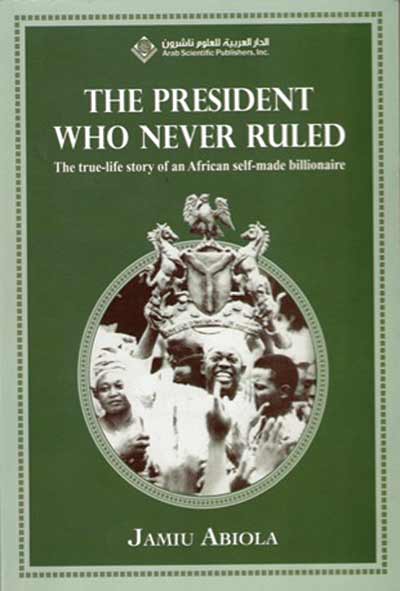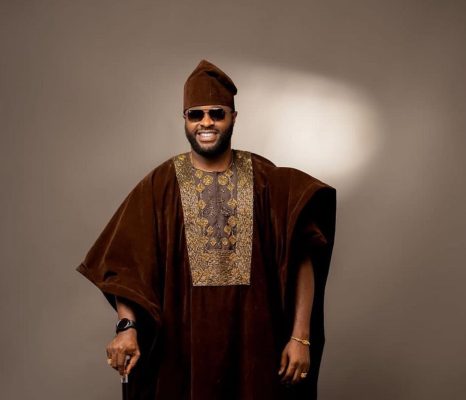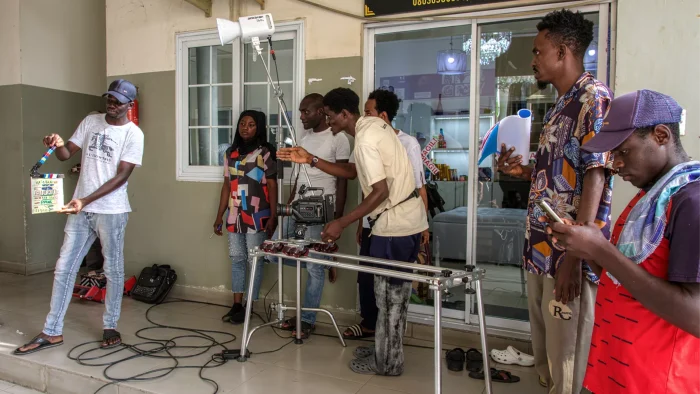 JAMIU Abiola’s The President Who Never Ruled is a novel. But it is neither a fiction nor a faction. Indeed, it seems novel to present a biography in the form of a novel as the author has done.
JAMIU Abiola’s The President Who Never Ruled is a novel. But it is neither a fiction nor a faction. Indeed, it seems novel to present a biography in the form of a novel as the author has done.
Of course, one was expecting to read an interesting book, by virtue of the subject and title, when a good friend and elder sister of the author, Hafsat Abiola-Costello, provided a copy of this biography. But an error in the blurb, “how it lead to great wealth” provoked a momentary disappointment, not in the author but the publishers who permitted such in the blurb of a book for that matter.
Nonetheless, the book is a riveting account, in free-flowing prose, of the trials and triumphs of Moshood Kashimawo Olawale (MKO) Abiola both as a child and adult and reversals that dogged his path politically.
Refreshing is the account of Abiola’s precociousness, his desire to assist his parents out of poverty by engaging in business even as a schoolboy. The parents were, however, adamant that nothing must stop his education or success in class. He assisted his father in his cocoa business, traded successfully in firewood until the business no longer yielded enough profit for him and then changed to singing, forming an orchestra to play at social functions – Kashy Mambo Orchestra.
He left the band after secondary school, having secured a job at Barclays Bank, Ibadan. He secured a scholarship two years after to study “Accountancy, Commercial Law, and Political Economy at Glasgow University and the Institute of Chartered Accountants of Scotland.”
A chance glance at a newspaper revealed an advert requesting the services of “The best African accountant…” in an undisclosed company. A series of competitive interview tests followed in Lagos, UK and New York. It was in the US that a staff of the mystery telecommunications industry finally submitted to Moshood: “Our human resources consultants have selected you. They say that you are the man we should work with in Nigeria… Another evaluation team, an external one, has agreed with their appraisal.” The brainy Moshood became the Controller of ITT in Nigeria – the ITT group, the largest telephone industry in the world and a major player in the field of military communications systems!
He resumed to what looked like a moribund office on April 1, 1969. ITT had supplied equipment worth £3.5m to the Nigerian army but Col Murtala Muhammed, the then army signals inspector, refused to sign the payment voucher alleging over-profit by ITT. Frustrated by being snubbed daily, Moshood exhibited what appeared like an act of derring-do, a pre-cursor to his post-1993 presidential election confrontation with the military.
He stood in front of Murtala’s office and blocked him from entering! Nothing ventured, nothing gained. Brigadier Usman Katsina overheard the altercation and ultimately resolved the issues. MKO left the Ministry of Defence with the cheque for a contract ITT had borrowed money to execute!
Moshood was shrewd. Cashing in on the nationalist/indigenisation policies of the military government, he demanded to be made the MD of ITT in Nigeria for the good of the company. “Within the next seven years,” wrote Jamiu, “Moshood became one of Africa’s richest businessmen… Hard work had undoubtedly contributed to his success but it would be foolhardy to ignore the fact that luck was a major factor as well. He was at the right company at the right time and anything that happened to him during that period seemed to be the right thing.”
His later friendship with Murtala paid off. His company got “a massive contract to supply telephone lines to the whole of Nigeria” under the Murtala administration. He demanded more from ITT and wrung out 49 per cent of its shares. “That was how Moshood, in his thirties, became one of Africa’s richest men…”
What actually led Abiola into politics? Jamiu provides a synopsis: “It was clear back then that Moshood had become a philosopher merchant or an ideological entrepreneur with a keen interest in philanthropy rather than just a regular businessman concerned only about profit. This was the genesis of the bridge that always linked him to politics till it eventually transported him into it.”
Interesting also is the account of how distraught Abiola became when the NPN refused to honour the agreement that power must return to the South after a single term of the Alhaji Shehu Shagari presidency. “Wealth no longer meant anything to him. All he wanted now was power, which would give him a chance to fix Nigeria, he hoped, and write his name in gold.” According to the author, the military president, Ibrahim Babangida, “had no plans to hand over to anybody” despite assurances to Abiola.
On June 12, 1993, religion counted for nothing for the first time in Nigeria. The presidential election was a watershed, the freest and fairest in Nigeria. The 197-page book gives a précis of how politicians traded with MKO’s mandate and how Abacha deceived him with a promise to help him reclaim his mandate, among others.
According to the author, MKO appeared to have taken the turn of events in his stride and began thinking of returning to his business until May 10, 1994, when he was treated as president during the inauguration of Mandela as South African president. Mandela, the author narrates, encouraged MKO not to give up just like he did not in the struggle against apartheid. Buoyed by the support of NADECO and labour unions, MKO, then 56, beat the security cordon around his house (was virtually under house arrest), declared himself president on June 11, 1994 at Epetedo in Lagos, went underground for some days, later arrested after an open procession to his house and remained in prison till his sudden death in July 1998 in questionable circumstances.
Jamiu’s mother, Kudirat Abiola, threw her whole being into the struggle to regain her husband’s mandate, rejecting money or oil blocks from the military. She was, allegedly, gunned down by the state’s killer squad on June 4, 1996. “The city of New York…decided to name the corner of 44th street on Second Avenue, where the Nigerian consulate is located after Kudirat Abiola in recognition of her heroic stance against tyranny.”
And one must mention in passing the Kudirat Initiative for Democracy (KIND), an NGO established by the daughter of the heroine and democracy martyr, Hafsat, to promote democracy by “strengthening organisations and creating initiatives that advance the global societal position of women.”
Worthy of note in the book was the futile trip of Jamiu and his brother to Abuja after no family member had been allowed to see MKO in more than a year, within which they also lost their mother to assassins’ bullets. They had been encouraged and led on the trip by an unnamed old man who had argued that Abacha would shudder to imagine a headline like, “Government prevents the sons of Kudirat Abiola from seeing their father after death.” How mistaken were they! They were dealing with a stone!
Of course, international campaign for reparations from the West on five centuries of African slave trade seemed to begin and end with Abiola.
There are a few gaps in the book, which is divided into 44 chapters. It is not certain, mention is made of Nigerians murdered on the streets of Lagos for protesting the annulment of June 12 Presidential Election by the military. The travails of the NADECO members and international aspect of the struggle could have been detailed as well. Even worthy of mention is the economic cost of the post-annulment crises to the country. The perceived omissions can be corrected by Hafsat whenever she decides to provide her own perspectives on the subject matter. The publishers could also have done a better job with editing.
The concluding remark by the author is thought-provoking, saying, since the death of MKO, “the military has stayed away from governance and democracy has flourished in Nigeria… That was how President Moshood Abiola, my father and the president who never ruled, and Kudirat Abiola, my mother and his most loyal supporter, won in death the battle that claimed both their lives.” The President Who Never Ruled is an invaluable reference book and Jamiu deserves plaudits for this great work.
• Soyombo, author and public affairs commentator, sent this piece via [email protected]








